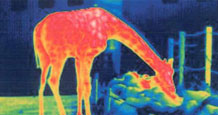
A thermal image of a giraffe - one of many similar images that feature in the exhibition Nature in a Different Light.
Exeter alumnus showcases research in thermal imaging wildlife art exhibition
Exeter alumnus Dr Chris Lavers is behind a unique photographic art exhibition featuring amazing thermal images of wildlife.
The exhibition, called Nature in a Different Light, has been seen by more than 65,000 people already and was recently on show at the ‘At Bristol Explore Centre’ in Bristol in June and will return October-November finishing with a Science Café talk.
The exhibition features thermal images of animals alongside conventional photographs – showing animals in a totally different light. Dr Chris Lavers uses the latest generation of thermal imaging cameras to produce the images of crocodiles, elephants, giraffes, kangaroos, giant tortoise and butterflies. The thermal images were taken over the last decade at Paignton Zoo Environmental Park, Paignton, and the Buckfast Otter and Butterfly Sanctuary.
Chris Lavers, Lecturer Plymouth University at Britannia Royal Naval College, Subject Matter Expert in Radar and Telecommunications, says: "I have been conducting thermal imagery for over a decade and thermal imagery of wildlife since 2002. I previously had a smaller thermal imaging exhibition at the Peter Chalk Centre at the University of Exeter, England in 2005.
"My experiences at Exeter as both an undergraduate and PhD student were extremely formative and life-changing, I started with nothing and left with a wife and daughter! I also had the benefit of some excellent physics teachers and Physics department PhD supervisor, Prof Roy Sambles FRS. His questioning approach led me into a direction of looking for unusual but different applications of various technologies including the use of satellite remote sensing for humanitarian monitoring and relief work."
As well as the thermal imaging of wildlife, Dr Lavers also has a research interest in high resolution satellite imagery for human rights monitoring, being a rare non-American recipient to one metre resolution imagery from the GeoEye Foundation. "My work has more recently been helped by Prof Tim Naylor (Physics) who has been aiding a team member undertaking a PhD with imaging analysis tools which benefit my work as well."
Chris has also had the privilege of working with Baroness Caroline Cox founder of the Humanitarian Aid Relief Trust (HART) on projects using high resolution satellite imagery to examine humanitarian trouble spots and areas of tribal persecution such as Zimbabwe, Burma, Darfur (Sudan), West Papua and India.
For more, see Dr Chris Laver’s website at the BBC Devon website: For a first camera view look at @bristol.
Date: 29 July 2010
